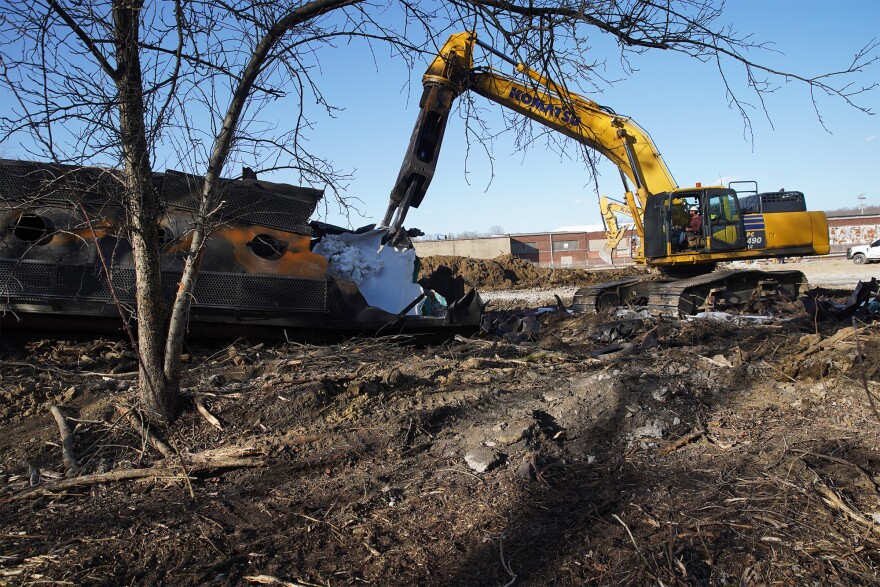East Palestine’s soil could be contaminated with dioxins, according to experts. But without proper testing, the reach and contamination level remain unclear.
Dioxins form when chlorine-based chemicals, like vinyl chloride, are burned. They are carcinogenic.
Following the controlled release of chemicals in East Palestine last month, experts, including Stephen Lester, science director with the Center for Health, Environment & Justice, say it’s likely dioxins formed and settled in soil and dust throughout the area.
“People are rightfully concerned that this might affect their health, their farms [and] their animals,” he said.
Dioxins, Lester said, were likely sent into the atmosphere during the controlled release that sent a black cloud plume over East Palestine.
“The black cloud is full of particulate matter and those particles would have been the perfect surface for the formation of dioxin to occur in... that burn,” Lester said. “These dioxins as they form on the particulate matter, will travel wherever the particulate matter goes.”
The dioxins themselves are dense, Lester said, meaning they fall from the atmosphere quickly, and once they land, they take years to break down.
As a panelist at a town hall on Feb. 23, University of Pittsburgh Associate Professor Carla Ng said there needs to be testing for dioxins and other byproducts created during the chemical burn.
“As we think about who’s affected [and] how far should we be looking is a little bit about where those smoke plumes went, and then at what point would the different chemicals fall out,” she said at the town hall. “This is why soil testing is so critical so we can start to understand the width of this cloud and how far things are affected.”
Potential impact of contaminated soil
Dioxin doesn’t degrade easily, Lester said, meaning that once in soil they will remain there for years until removed or until the soil dries out and becomes dust and is blown elsewhere.
Once dioxins land in the soil, they don’t move much, Lester said. But additional risks come with the livestock or wildlife that eat grass and plants on the contaminated soil.

“If cattle graze on farmland and eat grass where dioxin has settled, they will consume that dioxin and it will bio concentrate in their fat. So that means the meat and the dairy products, eggs in the case of chickens, milk in the case of cows, cheese,” Lester said. “How much risk that poses and how much danger that might pose for people is something that can only be addressed through information on the levels found in the soil.”
But some risk is presented by contaminated water, Executive Director of Penn Environment David Masur said, which can spread contamination through the water cycle.
“Certainly, when it rains, the rain then can carry contaminants, over the surface or deeper into the ground [and] into groundwater sources,” Masur said.
At the town hall, Ng advised against eating livestock or hunted wildlife while the presence and levels of dioxins are unknown.
“The same way that they recommended ‘until your well water is tested, drink bottled water,’ if there is a … contaminant like dioxin present, it helps to make sure you’ve got a clean source of feed,” she said. “By having a clean source of food, you can reduce exposure.”
Current testing and cleanup efforts
The U.S. Environmental Protection Agency conducts sampling to test for the presence of “indicator chemicals,” like chlorobenzenes and chlorophenols, that suggest a potential release of dioxins from the derailment, according to a letter signed by U.S. EPA Administrator Michael Regan and Ohio EPA Director Anne Vogel.
A letter, sent to Senators Sherrod Brown and J.D. Vance Thursday said Norfolk Southern was being ordered to begin testing for dioxins but emphasized that the expected risk of dioxins in the area remains low.
“As of February 28, EPA has collected at least 115 samples in the potentially impacted area, to include samples of air, soils, surface water, and sediments,” the letter states. “To date, EPA’s monitoring for indicator chemicals has suggested a low probability for release of dioxin from this incident.
If dioxins are found in the area, the EPA will alert the public and determine if the amount of dioxin poses risk to public and environmental health, the letter states. The EPA will also lead necessary cleanup efforts.
More than 1,700 tons of contaminated soil and solid waste have been removed from the area as of Friday. But, Lester said, it’s impossible to know how far cleanup efforts should reach, or how to properly handle contaminated material without knowing if, where and how much dioxins are present.
“It’s a dangerous proposition trying to clean up an area without knowing what you're cleaning up and what the concentration of the chemicals are,” he said. “It's dangerous for the workers who are on the front line of that process, and it's dangerous for the surrounding neighborhood and the community.”
Expert recommendations
Lester said he would advise the residents of East Palestine and the surrounding area to continue to push for more testing.
“The most important thing right now for people is to be advocating for the testing of the soil, air and water for dioxin and other contaminants,” he said. “The cleanup should not be continuing without that knowledge and information, because that's likely just redistributing the contaminants in the air and back into the soil.”



